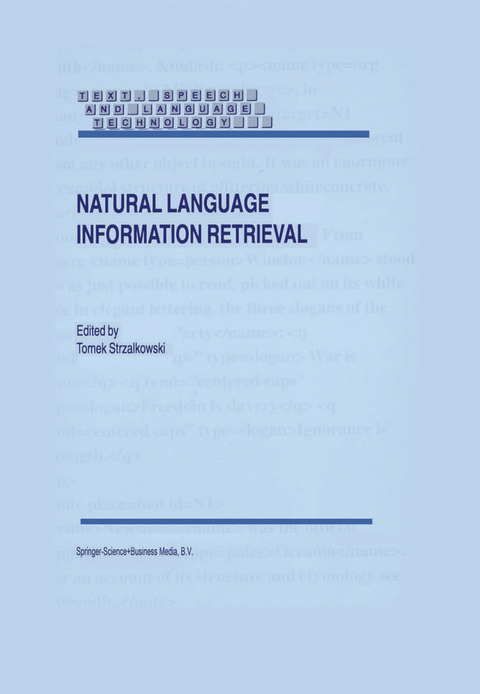
Natural Language Information Retrieval
Springer (Verlag)
978-90-481-5209-4 (ISBN)
1 What is the Role of Nlp in Text Retrieval?.- 2 NLP For Term Variant Extraction: Synergy Between Morphology, Lexicon, and Syntax.- 3 Combining Corpus Linguistics and Human Memory Models for Automatic Term Association.- 4 Using NLP or NLP Resources for Information Retrieval Tasks.- 5 Evaluating Natural Language Processing Techniques in Information Retrieval.- 6 Stylistic Experiments in Information Retrieval.- 7 Extraction-Based Text Categorization: Generating Domain-Specific Role Relationships Automatically.- 8 LaSIE Jumps the GATE.- 9 Phrasal Terms in Real-World IR Applications.- 10 Name Recognition and Retrieval Performance.- 11 COLLAGE: An NLP Toolset to Support Boolean Retrieval.- 12 Document Classification and Routing.- 13 Murax: Finding and Organizing Answers from Text Search.- 14 The Use of Categories and Clusters for Organizing Retrieval Results.
| Reihe/Serie | Text, Speech and Language Technology ; 7 |
|---|---|
| Zusatzinfo | XXV, 384 p. |
| Verlagsort | Dordrecht |
| Sprache | englisch |
| Maße | 170 x 244 mm |
| Themenwelt | Geisteswissenschaften ► Sprach- / Literaturwissenschaft ► Sprachwissenschaft |
| Informatik ► Datenbanken ► Data Warehouse / Data Mining | |
| Informatik ► Software Entwicklung ► User Interfaces (HCI) | |
| Informatik ► Theorie / Studium ► Künstliche Intelligenz / Robotik | |
| ISBN-10 | 90-481-5209-7 / 9048152097 |
| ISBN-13 | 978-90-481-5209-4 / 9789048152094 |
| Zustand | Neuware |
| Informationen gemäß Produktsicherheitsverordnung (GPSR) | |
| Haben Sie eine Frage zum Produkt? |
aus dem Bereich


